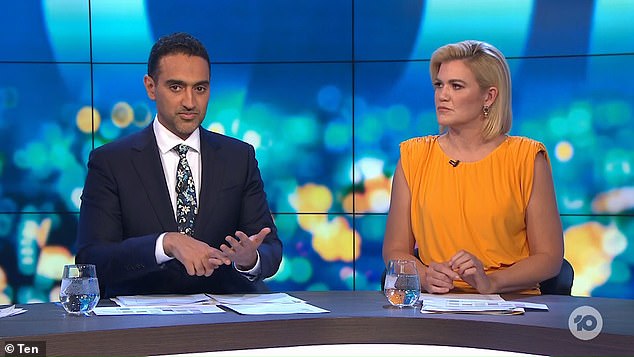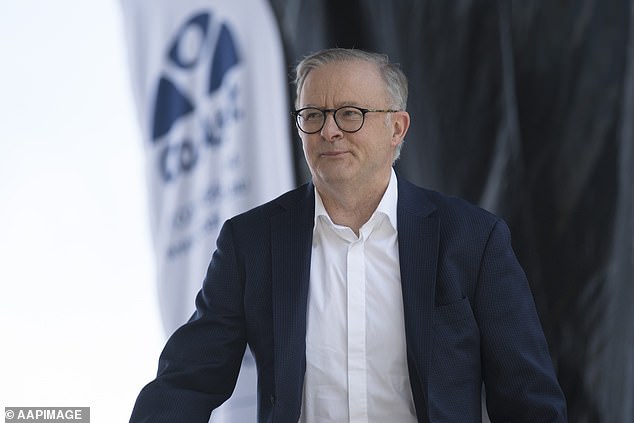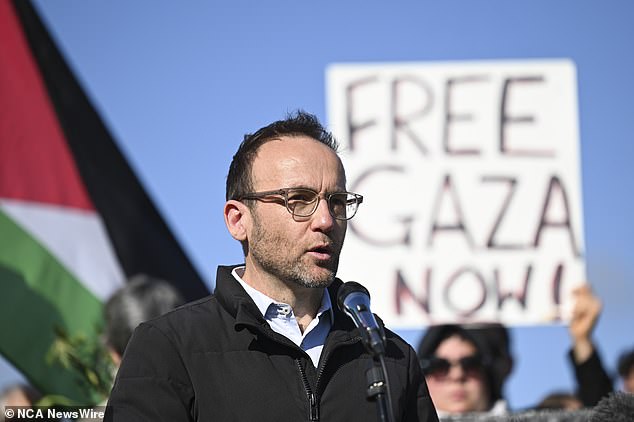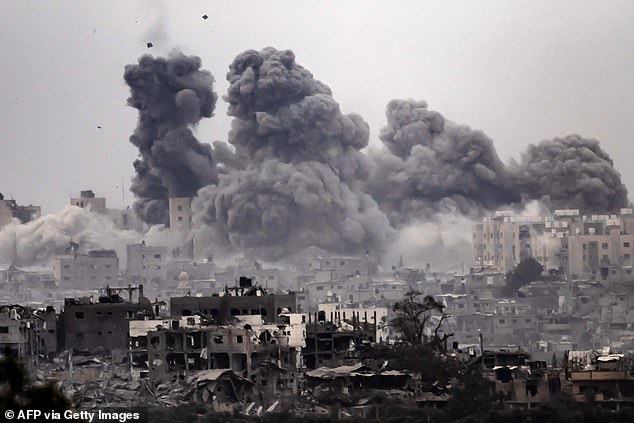Waleed Aly’s chilling prediction about the war in Gaza – and the five words that will strike fear into anyone hoping for an Israeli ceasefire
Waleed Aly has made a terrifying prediction about the war between Israel and Hamas, saying the conflict could last “months” or even years and spell disaster for the entire region.
Aly told The Project on Monday that there is no hope for an end to the conflict, which began when terrorist group Hamas launched a series of coordinated attacks on Israel on October 7, due to Israel’s refusal to consider a ceasefire .
The 45-year-old journalist and academic, a Sunni Muslim, summarized the Jewish state’s attitude toward a possible ceasefire in five words: “That is not an option.”
Aly also described the unfolding of the war – the final bloody chapter in the Israeli-Palestinian conflict that first began in 1948 – as “scary” and “horrifying.”
Waleed Aly has made a terrifying prediction about the war between Israel and Hamas, saying the conflict could last “months” or even years and spell disaster for the entire region. (Image: Palestinians mourn their relatives killed in the Israeli bombardment of the Gaza Strip at a mortuary in Khan Younis on Sunday)
According to the Health Ministry in Gaza, the Palestinian death toll from Israeli retaliation has passed 8,000, most of them women and children.
More than 1,400 people in Israel have been killed, the majority of whom were civilians, in Hamas’s first land, air and sea attack on October 7.
There are increasing calls from governments and peace organizations around the world for a ceasefire to stop civilian deaths in Gaza.
But Israelis are not giving in and remain determined to return the more than 200 hostages Hamas took hostage during the deadly rampage three weeks ago.
“It’s the scariest and most horrifying thing for me,” Aly began.
“I don’t see any way that it won’t actually get worse – as unimaginable as that is – because even the idea of a ceasefire is not an option as far as Israel is concerned, because they will just say, ‘Well, that just means that Hamas will regroup.”
“So if that is their attitude, then a ceasefire is like telling them that they cannot defend themselves and that they will never accept that because that is their interpretation of those events.”
He continued, “This feels to me like it could easily become a profound escalation that will continue. This is going to take months, it could take a year, and the entire region is on fire.”

Aly (left, with Sarah Harris) told The Project on Monday that there is no hope for an end to the conflict, which began when the terrorist group Hamas launched a series of coordinated attacks on Israel on October 7, due to Israel’s refusal to consider a ceasefire
Aly’s comments come after the Albanian government sparked backlash for abstaining from a United Nations motion calling for an immediate ceasefire between Israel and Hamas.
The non-binding resolution, drafted by Jordan, called for an immediate humanitarian ceasefire in the bloody conflict between the Jewish state and the terrorist organization.
The measure was adopted in a vote at the UN General Assembly in New York, with 120 countries supporting the measure, 14 voting against and 45 abstaining, including Australia.
The move has sparked backlash on both sides of the political party, with members of the Jewish and Muslim communities also left unhappy.
Opposition Leader Peter Dutton slammed Prime Minister Anthony Albanese’s leadership as “weak” for not supporting the US and Israel, which voted against the motion.
“The Prime Minister had an opportunity here at the United Nations to send a clear message about our values and where we stand, and he failed that test,” Dutton told Sky News.

Aly’s comments come after the Albanian government sparked a backlash for abstaining from a United Nations motion calling for an immediate ceasefire between Israel and Hamas.
“And I think it was an incredibly weak show of leadership from the prime minister.”
The Australian Jewish Association also accused Mr Albanese of “weak” leadership.
“The Albanian government should have stood with Israel, the US and the fourteen countries that voted against the shameful resolution, including many in our region,” the lobby group wrote on X.
At the other end of the political spectrum, Greens leader Adam Bandt was equally scathing.
“Labour’s inability to vote for a ceasefire with most of the world is unacceptable,” Bandt wrote on X.
“Labor must work for peace, not war, in Gaza and the Middle East.”
Former Australian Craig Forster expressed similar sentiments, calling Australia’s position ‘deplorable’.
“The news that Australia has overnight abstained from a United Nations vote on protecting civilians and upholding legal and humanitarian obligations is regrettable and deeply, deeply sad,” he said.
“Australia’s commitment to international human rights and humanitarian law should be a given.”

Greens leader Adam Bandt branded Australia’s inability to support a ceasefire ‘unacceptable’
The Australian Muslim community has also expressed its dissatisfaction with the position.
Kamalle Dabbaussy, head of the Federation of Islamic Councils, said there was even talk of blocking Labor MPs from mosques and community centres.
“There is anger in the community and talk of questioning the value of engagement,” Mr Dabboussy said.
Adel Salman of the Islamic Council of Victoria said Labor’s “one-sided” support for Israel so confused community leaders that centers closed their doors to government MPs.
The General Delegation of Palestine to Australia, which represents the Palestinian Authority that governs the West Bank, also called Australia’s decision “very disappointing.”
Australian Palestinian Network chairman Nasser Mashni also expressed disappointment, calling the fighting in Gaza “catastrophic.”
However, there was a rare show of support for Australia’s position from the president of the Zionist Federation of Australia, Jeremy Leibler.
“Australia made the right decision not to support a UN General Assembly resolution on Gaza that did not condemn the barbaric terrorist attack… or call for the release of more than 229 hostages,” it said he.

Smoke rises after Israeli forces bomb the Gaza Strip as fighting continues
Australia’s UN Ambassador and Permanent Representative James Larsen told the Assembly that Australia “abstained with disappointment” because the motion was “incomplete”.
“How Israel defends itself matters,” he said, echoing comments from Foreign Minister Penny Wong.
“We can affirm Israel’s right to defend itself, while also saying that how it does so matters,” he said.
While abstaining from voting on the ceasefire, Australia called for “a humanitarian pause in hostilities so that food, water, medicine and other essential aid can reach people in desperate need, and so that civilians can reach safety.”
